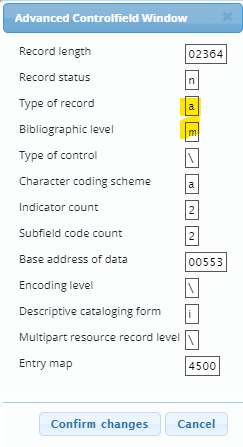New bibliographic record by cloning: Difference between revisions
(Work in progress on new article) |
(→Preliminary records for new acquisitions: Added 000 and 007) |
||
| Line 3: | Line 3: | ||
==Preliminary records for new acquisitions== | ==Preliminary records for new acquisitions== | ||
In most cases, it is best to start from a Template. This reduces the chances that the new record will carry over incorrect or outdated hidden coding, or that key features will be missing. The exception is cloning from a newly-created preliminary record when other material in the batch is nearly identical (since there is no chance that legacy coding from Voyager will create difficulties). | In most cases, it is best to start from a Template. This reduces the chances that the new record will carry over incorrect or outdated hidden coding, or that key features will be missing. The exception is cloning from a newly-created preliminary record when other material in the batch is nearly identical (since there is no chance that legacy coding from Voyager will create difficulties). | ||
Make sure that the following MARC fields are correct. | |||
===== MARC 000 (also known as the "Leader") ===== | |||
[[File:TIND Record Editor 000.png|thumb|TIND's 000 field in Record Editor view]] | |||
* Type of record (this affects the "Narrow by collection" box). The most common ones at the Folger are in '''bold'''. | |||
** '''a''' = printed text (including printed forms filled in by hand) | |||
** c = printed notated music | |||
** d = manuscript notated music | |||
** e = printed map or atlas | |||
** f = manuscript map or atlas | |||
** g = moving image (e.g., DVD) | |||
** i = non-musical sound recording | |||
** j = musical sound recording | |||
** '''k''' = still image (e.g, engraving, photo, painting) | |||
** m = computer file (very rarely used: it's for actual computer programs, not digital media) | |||
** p = mixed materials (rarely used: it's for a collation of materials of different types) | |||
** '''r''' = object (e.g., sculpture, game, souvenir spoon) | |||
** '''t''' = manuscript text | |||
* Bibliographic record (this affects the "Narrow by collection" box). The most common ones at the Folger are in '''bold'''. | |||
** a = monographic component part (not used for preliminary records) | |||
** b = serial component part (not used for preliminary records) | |||
** '''c''' = collection (any group of intellectually separate items, even if they're together in the same binding, box, or folder) | |||
** d = subunit (not used for preliminary records) | |||
** i = integrating resource (not used for preliminary records) | |||
** '''m''' = monograph (any single item or multi-part set, not just books; exception: a single volume containing multiple separate things (e.g, [[sammelbands]]) are coded "c" for "collection"). | |||
** '''s''' = serial (rarely used for vault material) | |||
===== MARC 007 ===== | |||
Delete if present. (This field triggers a cascade of machine updates that requires cataloger intervention.) | |||
===== MARC 008 ===== | |||
(information to come) | |||
Revision as of 12:46, 24 January 2023
TIND offers several ways to create a new bibliographic record in the catalog. This article covers creating a new record by copying an existing record using the "Clone record" function in the Record Editor.
Preliminary records for new acquisitions
In most cases, it is best to start from a Template. This reduces the chances that the new record will carry over incorrect or outdated hidden coding, or that key features will be missing. The exception is cloning from a newly-created preliminary record when other material in the batch is nearly identical (since there is no chance that legacy coding from Voyager will create difficulties).
Make sure that the following MARC fields are correct.
MARC 000 (also known as the "Leader")
- Type of record (this affects the "Narrow by collection" box). The most common ones at the Folger are in bold.
- a = printed text (including printed forms filled in by hand)
- c = printed notated music
- d = manuscript notated music
- e = printed map or atlas
- f = manuscript map or atlas
- g = moving image (e.g., DVD)
- i = non-musical sound recording
- j = musical sound recording
- k = still image (e.g, engraving, photo, painting)
- m = computer file (very rarely used: it's for actual computer programs, not digital media)
- p = mixed materials (rarely used: it's for a collation of materials of different types)
- r = object (e.g., sculpture, game, souvenir spoon)
- t = manuscript text
- Bibliographic record (this affects the "Narrow by collection" box). The most common ones at the Folger are in bold.
- a = monographic component part (not used for preliminary records)
- b = serial component part (not used for preliminary records)
- c = collection (any group of intellectually separate items, even if they're together in the same binding, box, or folder)
- d = subunit (not used for preliminary records)
- i = integrating resource (not used for preliminary records)
- m = monograph (any single item or multi-part set, not just books; exception: a single volume containing multiple separate things (e.g, sammelbands) are coded "c" for "collection").
- s = serial (rarely used for vault material)
MARC 007
Delete if present. (This field triggers a cascade of machine updates that requires cataloger intervention.)
MARC 008
(information to come)
